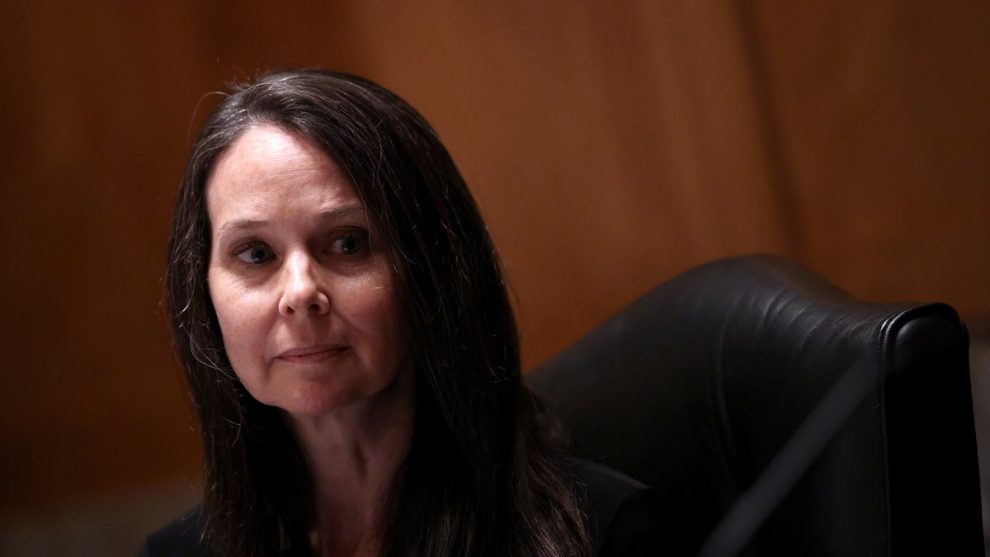A federal agency in the Department of Homeland Security (DHS) that’s been scrutinized for what critics argue is suppression of dissenting political views under the guise of combating disinformation now appears to be “burying” evidence of its alleged censorship, experts and watchdog groups say.
The Cybersecurity and Infrastructure Security Agency, or CISA, has come under fire for working with Big Tech companies to flag and take down social media posts related to elections, COVID vaccines, and a range of other issues that were deemed mis-, dis-, and malinformation (MDM).
Now it appears the agency may be concealing its efforts to monitor domestic content posted by regular Americans and focusing exclusively on its campaign to combat foreign actors in what some observers say is a move designed to hide government overreach, according to research compiled by Mike Benz, the Foundation for Freedom Online’s executive director.
CISA’s current webpage on its MDM mission discusses “foreign influence operations and disinformation … targeting election infrastructure” and makes no mention of domestic activity.
However, this new page has a short web archive history, only having a record of existing since late last month.
The old CISA webpage on MDM discusses both “foreign and domestic threat actors [using] MDM campaigns to cause chaos, confusion, and division,” describing them as “malign.” The page also describes CISA’s mission in much broader terms as working “in close coordination with interagency and private sector partners, social media companies, academia, and international partners on a variety of projects to build resilience against malicious information activities.”
The web address for the old page — cisa.gov/mdm — takes internet users to the new page.
CISA was originally created to protect the nation’s “cyber and physical infrastructure,” including domestic websites from foreign hackers. The agency was a leading force in the Countering Foreign Influence Task Force, which was designed to combat election-related disinformation.
However, CISA’s mission quickly morphed and broadened to countering “disinformation campaigns and efforts that appear in social media,” according to an August 2022 DHS Office of Inspector General report. CISA replaced the Countering Foreign Influence Task force with an MDM team, whose purview extended beyond election-related matters and also focused on domestic, not just foreign, content.
“In January 2021, CISA transitioned its Countering Foreign Influence Task Force to promote more flexibility to focus on general MDM,” the DHS Inspector General wrote. “A CISA official stated that the component established an MDM team with a total of 15 dedicated part- and full-time staff. The MDM team focuses on disinformation activities targeting elections and critical infrastructure. According to a CISA official, the MDM team counters all types of disinformation, to be responsive to current events. For example, the MDM team developed the COVID-19 Disinformation Toolkit to raise awareness related to the pandemic.”
The pandemic was just the start. According to a draft copy of a major DHS report obtained by The Intercept in October, the department planned to target “inaccurate information” on a wide range of topics, including “the origins of the COVID-19 pandemic and the efficacy of COVID-19 vaccines, racial justice, U.S. withdrawal from Afghanistan, and the nature of U.S. support to Ukraine.”
Jen Easterly, who President Biden appointed as director of CISA, doubled down on the agency’s expanding mission at a conference in November 2021.
“One could argue we’re in the business of critical infrastructure, and the most critical infrastructure is our cognitive infrastructure, so building that resilience to misinformation and disinformation, I think, is incredibly important,” she said.
CISA has been widely criticized for expanding its focus beyond its initial mandate. Given this history, experts argued the recent changes made to its website are a sign of an agency trying to hide unpopular activity.
ACLU SLAMS GOVERNMENT WORKING WITH BIG TECH TO DECIDE ‘WHAT IS TRUE OR FALSE’
“CISA pulled a fast one on the American public by setting up a social media censorship division in the name of fighting foreign influence, but then quickly seizing long-arm jurisdiction over domestic opinions online as well,” Benz told Fox News Digital. “CISA officials knew they lacked the legal authorization to do what they did. Now, CISA appears to be burying the evidence of its domestic censorship activities, right as oversight of potential malfeasance is heating up.”
Benz is hardly the first person to note CISA had questionable legal authorization to combat election disinformation.
“There was a lack of capability around election disinformation. This is not because CISA didn’t care about disinformation, but at the time they lacked both kind of the funding and the legal authorizations to go do the kinds of work that would eb necessary to truly understand how election disinformation was operating,” Alex Thomas, director of the Stanford Internet Observatory, said last year at an event hosted by the Atlantic Council think tank.
The Stanford Internet Observatory helped convene the Election Integrity Partnership (EIP), a project combining a coalition of government, Big Tech, civil society, academia, and others “to defend our elections against online behavior harmful to the democratic process.”
Oversight and Investigations Subcommittee Chairman Dan Bishop, R-N.C., sounded the alarm in a statement to Fox News Digital, saying it “raises more questions than answers about the focus and priorities of the agency.”
“CISA’s stealth course correction raises more questions than answers about the focus and priorities of the agency. CISA should be acutely focused on protecting critical infrastructure against foreign threats, not on domestic censorship of Americans,” Bishop said. “It’s unacceptable, point blank. CISA can expect inquiries from the Oversight, Investigations, and Accountability Subcommittee to ensure that it does not deviate from its critical mission.”
The EIP worked with CISA and others to target what it deemed online disinformation.
“CISA pulled a fast one on the American public by setting up a social media censorship division in the name of fighting foreign influence, but then quickly seizing long-arm jurisdiction over domestic opinions online as well,” Michael Chamberlain, director of Protect the Public’s Trust, told Fox News Digital. “CISA officials knew they lacked the legal authorization to do what they did. Now, CISA appears to be burying the evidence of its domestic censorship activities, right as oversight of potential malfeasance is heating up.”
In a statement to Fox News Digital, however, CISA denied ever conducting censorship of Americans and said the changes to its website were part of a broader redesign.
“CISA does not and has never censored domestic political speech,” said an agency spokesperson. “As part of a recent redesign of CISA.gov, we clarified language describing CISA’s work on foreign influence operations and disinformation related to the security and administration of elections. CISA provides broad information on disinformation tactics, mitigates the risk of disinformation by sharing accurate information, and amplifies the voices of state and local election offices. As the website notes, this work continues to be done in close partnership with the interagency, private sector, academia, and international stakeholders. We remain committed to building resilience to foreign influence operations and disinformation so the American people don’t face the brunt of these threats on their own.”
Still, lawmakers began sounding the alarm about CISA’s activities in November, shortly after newly published documents detailed how DHS was still working with Big Tech to restrict speech on a variety of major political topics through policing “disinformation.”
Republicans on the House Oversight Committee launched an investigation into what they called a “taxpayer-funded censorship campaign” at DHS.
“CISA is framing any dissenting opinion disseminated online as a cyber threat to critical infrastructure,” House Republicans, led by Rep. James Comer, R-Ky., wrote in a letter to DHS Secretary Alejandro Mayorkas. “CISA leverages partnerships with left-leaning private organizations — who have received millions of dollars in federal money — to identify and then take action against political speech unfavorable to the administration, especially around its handling of COVID-19 policy.”
























